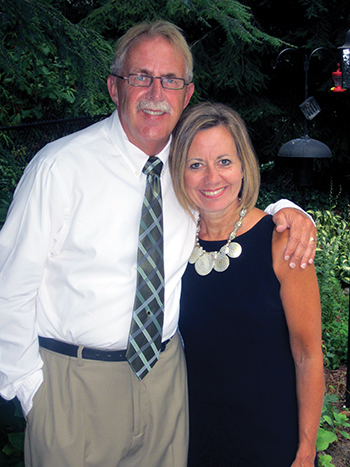Chronic Lymphocytic Leukemia Survivor

Round up a terrific support system
Massaging a knot on my neck didn’t make it go away. It only got bigger. And then another one appeared below it. After a round of antibiotics, a needle biopsy and surgery to remove one of the swollen lymph nodes, what I hoped might be just an infection was diagnosed as chronic lymphocytic leukemia (CLL).
My wife is a 10-year breast cancer survivor and was treated at a comprehensive cancer center not far from our home. Our experience there was excellent. They coordinated everything for us, from consultations and appointments to tests and procedures. It took the pressure off of us to know what to do, so we immediately went there for my care.
I expected to meet my oncologist, get treated and life would move on. That’s not the way it happened. First, I was told CLL is not curable. It does, however, respond well to treatment, so that was a plus. Then I found out my CLL hadn’t progressed enough to need treatment. That put me into a period of watchful waiting. Although it made sense not to treat until it was necessary, it was a little discombobulating.
My oncologist planned to monitor my lymph nodes and blood levels very carefully, and she made a deal with me. It was her job to let me know when she was concerned. It was my job to live as healthfully as I could.
I met with a nutritionist who helped me think through healthier options. For me, that meant minimizing sugar because I have a fatty liver. Too much sugar combined with CLL is not good.
Our deal also included me staying off the internet. There are a lot of worst-case cancer scenarios out there, and she reminded me that every person’s diagnosis is unique and no one responds to treatments in the same way. That was very good advice because cancer is an anxiety-inducing diagnosis — and I had some anxiety, especially early on.
A year after my diagnosis, test results showed it was time to begin treatment. My oncologist gave me two options: a daily oral targeted therapy or chemotherapy combined with immunotherapy. I opted for the more convenient daily pill. She explained that targeted therapies eventually stop being effective, but when that happens, she will have another candidate. And, I would still have the combination therapy option.
Four months after starting the therapy, my white blood cell count looked good and my other numbers were headed in the right direction. I’m still on that same therapy, and I’ve had minimal side effects.
Part of my care included access to a therapist at the cancer center. I made an appointment, then cancelled it. After all, between my wife, kids, friends and oncologist, I already had a terrific support system. At my wife’s urging, I finally rescheduled, thinking that I’d meet the person and develop a relationship just in case. But, I felt like I’d struck gold. I left that first meeting with a long list of future appointments! Even the therapist suggested we might not need so many. It was just incredibly helpful to talk with a professional. And, I realized that it was unfair to expect my wife to be my therapist. Sometimes I have very serious worries that I don’t want to burden her with; other times, I just need someone else to listen.
As a literacy professor at a small liberal arts college, I’m a writer but had never written a blog. My wife encouraged me to start one. Along with being an outlet for expressing my feelings, it’s helped educate my friends. Cancer is an uncomfortable topic, and often people don’t know how to talk about it. Or, they are so afraid to say the wrong thing that they don’t say anything at all. I used my blog to talk about my diagnosis, and that has helped my friends feel more comfortable with my condition. Now, when someone asks how I feel or what my latest test results show, I know they care, and I appreciate it.
Having an incurable condition changes your outlook on a lot of things. It’s not all bad, just different. Our family has always done what we wanted when we wanted to, but CLL is limiting. I was diagnosed in 2016 at 62 years old, and retirement is fast approaching, but now we can’t just take off for three months because I have to be back for monthly follow-up tests. I’m hopeful my oncologist and I can figure out something in the future.
My advice to you...
Remember that treating CLL doesn’t mean curing it. It means getting back to feeling better.
Explore a comprehensive cancer center, if possible.
Put seeing a social worker or therapist high on your list. Even though I’m managing my CLL, I still have cancer. Regularly checking in with a therapist who has experience working with people who have chronic illnesses helps.
Round up your own support system filled with people who aren’t afraid to ask how you’re doing.


